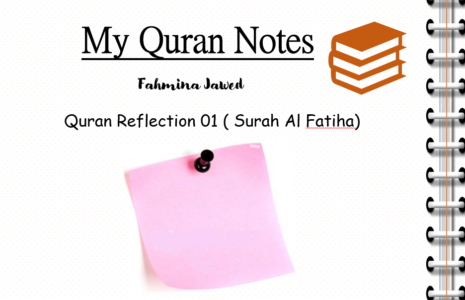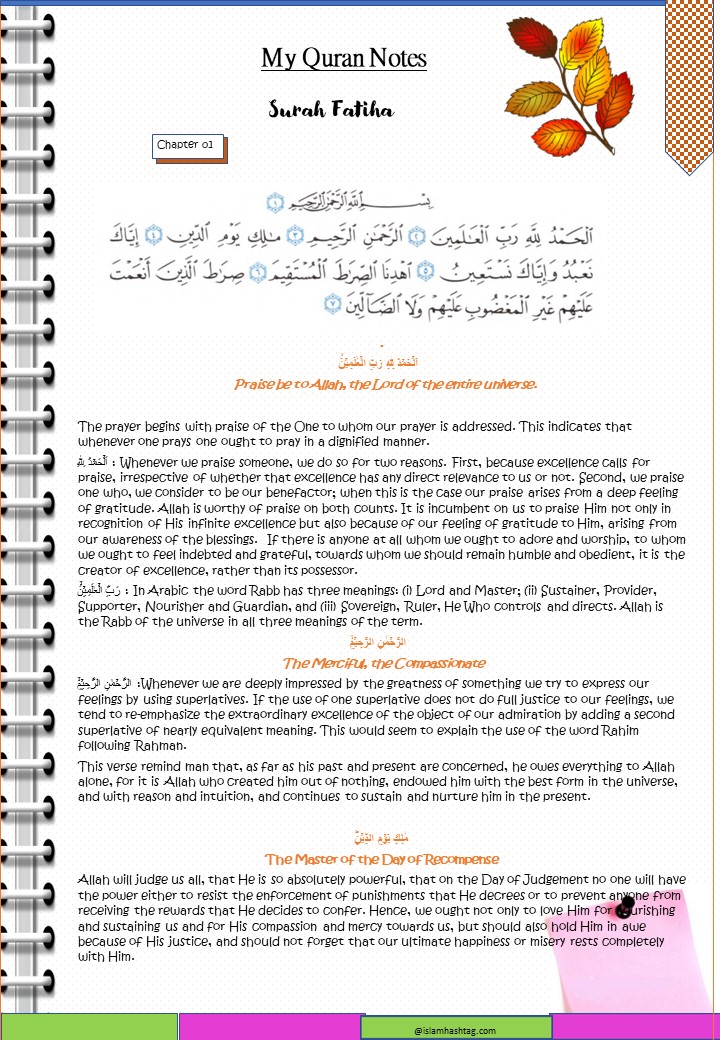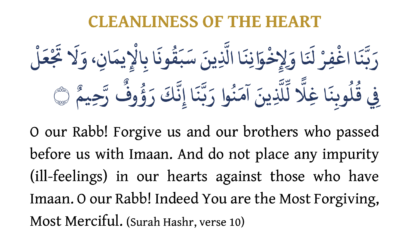Assalamu alaikum wrwb,
How are you all? Alhumdulillah we have entered the Islamic year 1444. In sha Allah this year we will have a weekly Quran Reflection. You can follow all our reflection by Subscribing to email, or following us in Instagram/facebook/twitter.
So, Let us start with Surah al Fatiha. Before we begin, read this article on Secrets of Surah Fatiha
Fatiha meaning is ‘The Opening’ or ‘The Opener’
Surah Al Fatiha- The Preface of the Quran
Surah Fatiha is like the preface of the Quran. This preface is meant to create a strong desire in the heart of the reader to seek guidance from the Lord of the Universe, Who alone can grant it. Thus Surah Fatiha indirectly teaches that the best thing for a man is to pray for guidance to the straight path, to study the Quran with the mental attitude of a seeker- after-truth and to recognise the fact that the Lord of the Universe is the source of all knowledge. He should, therefore, begin the study of the Quran with a prayer to him for guidance.
From this theme, it becomes clear that the real relation between Surah Al Fatiha and the Quran is not that of an introduction to a book but that of a prayer and its answer. Surah Al Fatiha is the prayer from the servant and the Quran is the answer from the Master to his prayer. The servant prays to Allah to show him guidance and the Master places the whole of the Quran before him in answer to his prayer, as if to say, “This is the Guidance you begged from Me.
Surah Al Fatiha in English
- In the Name of Allah—the Most Compassionate, Most Merciful.
- All praise is for Allah—Lord of all worlds
- the Most Compassionate, Most Merciful,
- Master of the Day of Judgment.
- You ˹alone˺ we worship and You ˹alone˺ we ask for help.
- Guide us along the Straight Path
- the Path of those You have blessed—not those You are displeased with, or those who are astray.
Reflection on surah Al Fatiha
بِسۡمِ اللهِ الرَّحۡمٰنِ الرَّحِيۡمِ
In the name of Allah, the Merciful, the Compassionate
Virtue of saying Bismillah:
- By saying Bismillah, one will be able to restrain oneself from many misdeed, since the habit of pronouncing the name of Allah is bound to make one wonder when about to commit some offence how such an act can be reconciled with the saying of Allah’s holy name.
- If a man pronounces the name of Allah before starting good and legitimate tasks, this act will ensue that both his starting point and his mental orientation are sound.
- when a man begins something by pronouncing Allah’s name, he will enjoy Allah’s support and succour; Allah will bless his efforts and protect him from the machinations and temptation of Satan. For whenever man turns to Allah, Allah turns to him as well.
اَلۡحَمۡدُ لِلّٰهِ رَبِّ الۡعٰلَمِيۡنَۙ
Praise be to Allah, the Lord of the entire universe.
The prayer begins with praise of the One to whom our prayer is addressed. This indicates that whenever one prays one ought to pray in a dignified manner.
اَلۡحَمۡدُ لِلّٰهِ : Whenever we praise someone, we do so for two reasons. First, because excellence calls for praise, irrespective of whether that excellence has any direct relevance to us or not. Second, we praise one who, we consider to be our benefactor; when this is the case our praise arises from a deep feeling of gratitude. Allah is worthy of praise on both counts.
It is incumbent on us to praise Him not only in recognition of His infinite excellence but also because of our feeling of gratitude to Him, arising from our awareness of the blessings. If there is anyone at all whom we ought to adore and worship, to whom we ought to feel indebted and grateful, towards whom we should remain humble and obedient, it is the creator of excellence, rather than its possessor.
رَبِّ الۡعٰلَمِيۡنَۙ : In Arabic the word Rabb has three meanings: (i) Lord and Master; (ii) Sustainer, Provider, Supporter, Nourisher and Guardian, and (iii) Sovereign, Ruler, He Who controls and directs. Allah is the Rabb of the universe in all three meanings of the term.
الرَّحۡمٰنِ الرَّحِيۡمِۙ
The Merciful, the Compassionate
الرَّحۡمٰنِ الرَّحِيۡمِۙ :Whenever we are deeply impressed by the greatness of something we try to express our feelings by using superlatives. If the use of one superlative does not do full justice to our feelings, we tend to re-emphasise the extraordinary excellence of the object of our admiration by adding a second superlative of nearly equivalent meaning. This would seem to explain the use of the word Rahim following Rahman.
This verse remind man that, as far as his past and present are concerned, he owes everything to Allah alone, for it is Allah who created him out of nothing, endowed him with the best form in the universe, and with reason and intuition, and continues to sustain and nurture him in the present.
مٰلِكِ يَوۡمِ الدِّيۡنِؕ
The Master of the Day of Recompense
Allah will judge us all, that He is so absolutely powerful, that on the Day of Judgement no one will have the power either to resist the enforcement of punishments that He decrees or to prevent anyone from receiving the rewards that He decides to confer. Hence, we ought not only to love Him for nourishing and sustaining us and for His compassion and mercy towards us, but should also hold Him in awe because of His justice, and should not forget that our ultimate happiness or misery rests completely with Him.
اِيَّاكَ نَعۡبُدُ وَاِيَّاكَ نَسۡتَعِيۡنُؕ
You alone do we worship, and You alone do we turn for help
The term ibadah is used in three sense: (i) worship and adoration; (ii) obedience and submission; and (iii) service and subjection. In this particular context the term carries all these meanings simultaneously. In other words, we say to Allah that we worship and adore Him, that we are obedient to Him and follow His will, and also that we are His servants.
Not only do we worship Allah, but our relationship with Him is such that we turn to Him alone for help and succour. We know that He is the Lord of the whole universe and that He alone is the Master of all blessings and benefactions. Hence, in seeking the fulfilment of our needs we turn to Him alone. It is towards Him alone that we stretch forth our hands when we pray and supplicate. It is in Him that we repose our trust. It is therefore to Him alone that we address our request for true guidance.
اِهۡدِنَا الصِّرَاطَ الۡمُسۡتَقِيۡمَۙ
Direct us on to the Straight Way
Allah Himself, in His great mercy, has taught man what to pray for
We beseech Allah to guide us in all walks of life to a way which is absolutely true, which provides us with a properly-based outlook and sound principles of behaviour, a way which will prevent our succumbing to false doctrines and adopting unsound principles of conduct, a way that will lead us to our true salvation and happiness.
Guidance is a thing which everyone does possess in some way, and yet no one, not even the greatest, can do without wishing to attain more of its advanced and higher stages. Hence, of all the prayers man can address to Allah, the most important is the prayer for guidance, which has been taught to us in the very first Surah of the Holy Quran; and this prayer is as necessary for the greatest of prophets and men of Allah as for an ordinary Muslim.
صِرَٰطَ ٱلَّذِينَ أَنْعَمْتَ عَلَيْهِمْ غَيْرِ ٱلْمَغْضُوبِ عَلَيْهِمْ وَلَا ٱلضَّآلِّينَ
the Path of those You have blessed—not those You are displeased with, or those who are astray.
صِرَٰطَ ٱلَّذِينَ أَنْعَمْتَ عَلَيْهِمْ The path of those on whom You have bestowed Your grace). As to who these people are, another verse of the Holy Qur’an gives us details in the following words:
وَمَن يُطِعِ ٱللَّهَ وَٱلرَّسُولَ فَأُو۟لَـٰٓئِكَ مَعَ ٱلَّذِينَ أَنْعَمَ ٱللَّهُ عَلَيْهِم مِّنَ ٱلنَّبِيِّـۧنَ وَٱلصِّدِّيقِينَ وَٱلشُّهَدَآءِ وَٱلصَّـٰلِحِينَ ۚ وَحَسُنَ أُو۟لَـٰٓئِكَ رَفِيقًا
And whoever obeys Allah and the Messenger will be in the company of those blessed by Allah: the prophets, the people of truth, the martyrs, and the righteous—what honourable company!(4:69)
غَيْرِ ٱلْمَغْضُوبِ عَلَيْهِمْ Those who have incurred Allah’s wrath are the people, who inspite
of being quite familiar with the commandments of Allah wilfully go against them out of a calculated perversity or in the service of their desires, or, in other words, who are deficient in obeying divine
injunctions.
As for وَلَا ٱلضَّآلِّينَ (those who go astray), they are the people who, out of ignorance or lack of thought, go beyond the limits appointed by Allah, and indulge in excess and exaggeration in religious matters.
Ameen.
Reference : Maariful Quran. Tafheemul Quran, illuminating discourses.
Discover more from Islam Hashtag
Subscribe to get the latest posts sent to your email.







Fatiha suresinin açıklamsı gerçekten çok güzel olmuş. Emeğinize sağlık arkadaşım. Çalışmalarınızda başarılar dilerim.
best article for Quran 1st Surah i am also apricate for write this article for us